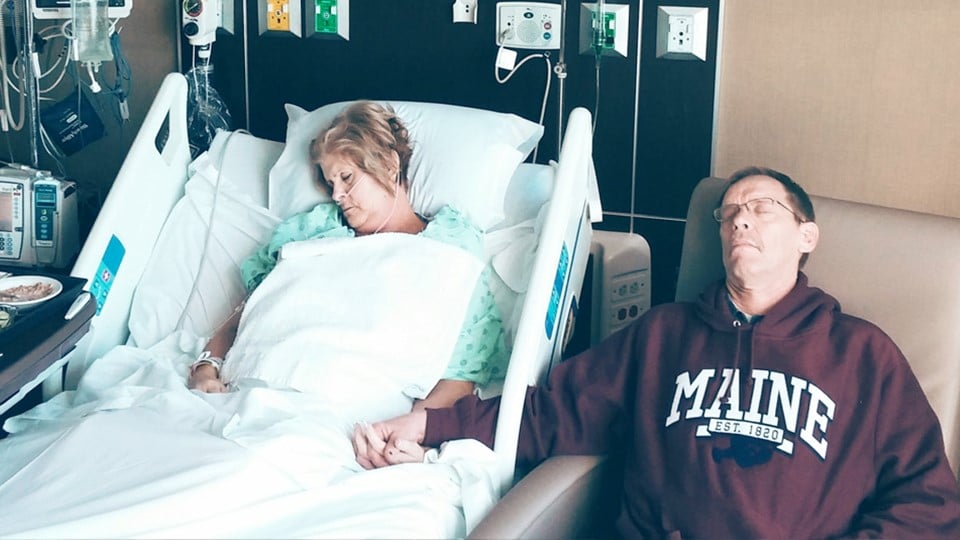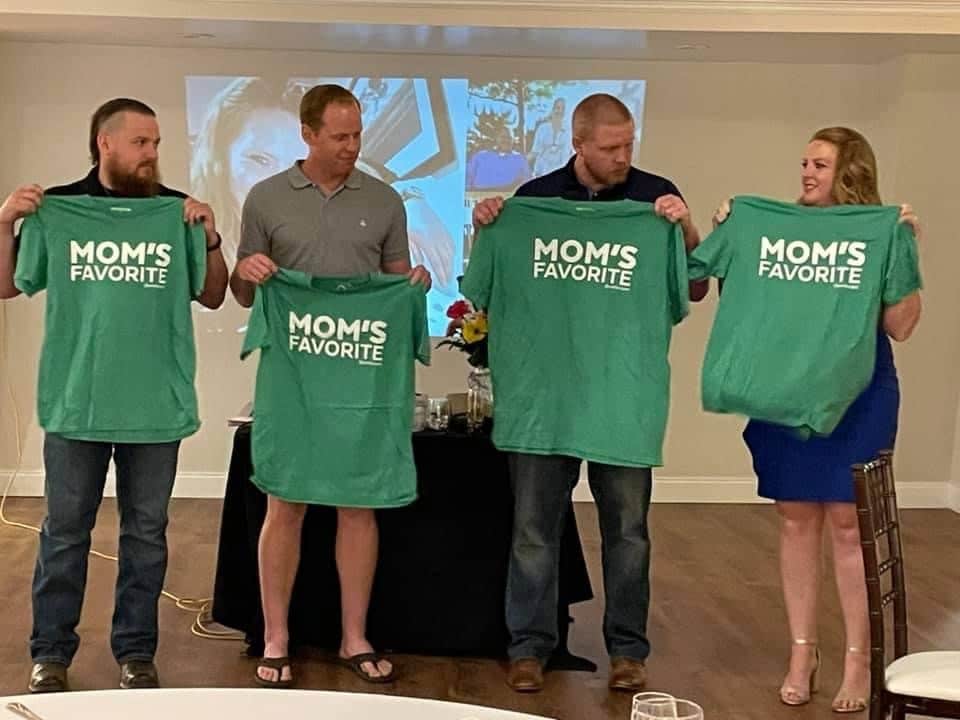Maureen, Diffuse Large B-Cell Lymphoma Survivor
Maureen, Diffuse Large B-Cell Lymphoma Survivor
Be Present. Take Care of Yourself and Each Other. Stay Positive.

Everything was great. We were getting ready to welcome a new year, 2016. All was falling into place. My four children were grown and self-sufficient. My husband and I had purchased a second home in Florida and had great plans of wintering there to get out of the brutal Illinois cold and gray. We daydreamed about drinking frozen rum runners after long days on the beach. My business was soaring. I felt like I had everything.
What I did not know was . . . I also had cancer.
After being diagnosed with stage 4 diffuse large B-cell lymphoma, the whirlwind of appointments, tests, procedures, and surgeries began. My doctor decided that a chemotherapy regimen would be best, so they inserted a port in my chest to administer it. I needed six rounds of inpatient chemo treatments. I also needed hip surgery and a steel rod insertion to repair the damage the advanced cancer had done to my femur. And I needed three spinal tap procedures (called intrathecal chemotherapy). I was in the fight of my life.

But it wasn’t just my life that was upended. My entire community was impacted throughout my diagnosis, treatment, and recovery, and it was my immediate family who shouldered the heaviest burden.
Now five years in remission, I wanted to know what advice those closest to me might have for others facing a similar path. This led directly to my 2021 book, 26 Points of Light: Illuminating One Cancer Survivor’s Journey from Diagnosis to Remission—I wanted the lessons they learned on their own journey to benefit anyone who has been impacted by a loved one’s diagnosis.
It is in that spirit that I share these reflections and insights. From my book—and from my family to yours—here are three key pieces of advice for those preparing for a similar journey.

#1: Be Present
If you want to make an impact but you aren’t sure how, my advice to you is simple: show up. Whether you’re the loud cheerleader for the patient directly or you’re the silent support for the supporter, showing up in these dark times will be the most powerful way to show you care. When you know someone has a tough game ahead, as they’re preparing, you can wish them good luck, or you can be there at the game. —CJ, son
Focus only on the things you can control. That’s going to be a challenge because everything is going to be in flux. That’s OK. Try to use the flow to get to where you need to be. If you use all your energy fighting the current, there won’t be anything for you to give the patient you are trying to care for. —Liam, son
People are generally supportive when the news first hits, but as time wears on, the kind words, notes, or gifts trail off. Consider sending a card or gift, making a phone call, or scheduling a time for lunch at the beginning, then set a reminder in your phone to do it again a month or two down the road. The consistent presence of community can never be underestimated. —Lizzy, daughter
The gift of peace of mind. Companionship and conversation—or simply being there in case you’re needed—is an incredible gift. —Dan, husband
Being present doesn’t mean you have to go to every hospital visit, treatment, or doctor appointment. We can’t all fit in that little room at once anyway! Being present might mean sending a card or flowers, preparing a meal, calling to let them know you’re thinking of them, sending regular texts, letting their dog out, or simply offering them time to not think about cancer for a little while. You have no idea how much of an impact that you make, no matter how big or small you believe your contribution. Even the small things matter! —Sean O’Brien, son
#2: Take Care Of Yourself and Each Other
It’s OK to go fishing (or however you relax). Because this is a marathon, there are going to be days where you literally can’t take one more thing. Remember that the caregiver needs a break too. Go and fish (or do whatever you do to recharge your batteries), and come back ready for what’s next. The patient is going to need your positivity to keep going. —Liam O’Brien, son
Those close to the patient—be they family members or close friends—carry so many emotions and fears on behalf of their loved one. If you are reading this as a friend of someone who has had a traumatic diagnosis, ask their family members how they are holding up. Now, they might not answer the question honestly or want to talk for too long (or even at all), but they will appreciate that you gave them space to do so. If they share, just give them space to release the weight of what they’ve been holding on to, and then be as empathetic as you possibly can. —Lizzy, daughter
Give the gift of communication. Sending a card or letter every so often gives the family and the patient the sense that someone is with them on the journey. And don’t forget about the gift of sleep. If someone you love is helping a loved one through a challenging diagnosis, make sure they get enough rest. —Dan, husband
#3: Stay Positive
It seems obvious, and at times, it might even seem impossible, but here it is: fight like hell to stay positive. There is incredible power behind positive thinking and maintaining a positive attitude. I believe that positivity can impact the body, the mind, and the spirit. I saw it in the faces of my family, our friends, and the hospital staff, and I could see the impact it had on my mom. Conversely, I also believe that negativity and doubt can be just as destructive as the cancer itself. If you are a friend or family member of someone battling cancer, stay positive. Never, for any reason, express doubt, negativity, or the slightest indication that the treatment might not work. Believe that it will. Believe that they can and will get better. —Sean O’Brien, son
My cancer journey was the most difficult fight of my life. During my darkest moments, knowing that my loved ones were right there alongside me gave me the strength I needed to persevere.
For anyone helping to support someone through a critical diagnosis, know that whatever you have to give, your efforts make a difference. My family and I hope this insight will help you face the path ahead, offer strength and tangible support, and care for yourself and each other so that you can continue to support your loved one during the journey ahead.
About the Author
Maureen O’Brien is a speaker, author, leadership expert, and cancer survivor. Armed with a degree in education and the equivalent of a PhD in hard knocks—and now five years in remission—O’Brien uses her experience to encourage and inspire others who may feel hopeless in the face of new challenges. Her book, 26 Points of Light, is available now.
